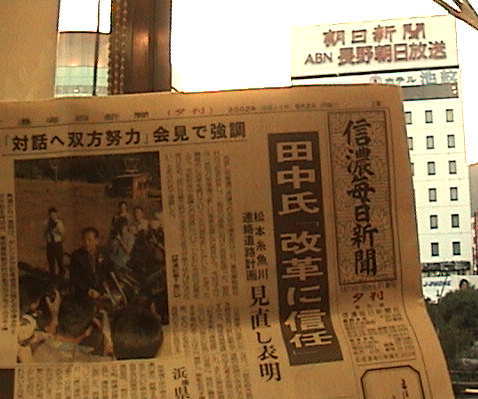 |
For voters, at least, democracy
in Japan
is a lose-lose proposition. 、、
Japan’s mainstream media have
done little
to exposeーmuch less fixーthe
political machine
that serves special interests
both on national
and on local levels.
結局、日本の民主主義は有権者に敗北しかもたらさなかった。、、
日本の主要なマスコミは国政でも地方政治でも、特定層の利権擁護の政治マシーンについてその実態をほとんど報道して来なかった。
|
長野県民は田中康夫にダブルスコアの80万票を与えた。
その結果にもっとも分かり易い反応を示したのは番犬としての日本の大手メディアだった。田中の圧勝に対する苦々しい反応が露骨に表れていた。それは旧来の構造そのものの変革に迫ろうとする国民に対する、狼狽と恐怖の表れであった。
NEWSWEEK 2002−9−11号のGeorge Wehrfritz
and Amy L. Webbのレポート「Losing By Winning In Nagano, an electoral victory could signal yet another
defeat for reform 」は田中康夫と長野県民、そして彼らに続く国民の闘いがラジカル(根源的)なものにならざるをえないことを告げている。
|

2002-9-2
|
Remarkably, Japan’s mainstream media missed
the big election story in Nagano by uncritically accepting the “character
issue” as a legitimate reason
for Tanaka’s
ouster. The Yomiuri Shimbun,
Japan’s largest
daily, set the tone for its coverage
the
day after the no-confidence vote
with an
editorial blaming Tanaka for
“drawing attention
to himself” and said “it would
be arrogant
for Tanaka to think that the
prefectural
assembly would go along with
his dam-free
policy be?cause of his popularity
among voters.”
On the same day, the Sankei Shimbun
ran an
editorial that declared “it
clear to everyone’s
eyes that Tanaka’s methods,
filled only
with ideology, were to become
ineffective
sooner or later.”
主要メディアがこの選挙の重要な争点を報道しようとしなかったことである、、、、
Most analysts underplayed the
need for an
economic growth model not reliant
on public-works
spending, and said little about
how serving
lawmakers were responsible for
the financial
crisis plaguing Nagano.
公共工事支出に頼らない経済成長モデルの必要性を論じないばかりか、長野の財政危機の責任が県議たちにあることも殆ど報じなかった、、
|
For voters, at least, democracy in Japan
is a lose-lose proposition. During the country’s
long postwar boom, popular apathy allowed
local power brokers to turn political pork
into huge fortunes. After Japan’s economy
cooled in the early 1990s, voters woke up
to an impending financial crisis. They elected
reformers who inspired them, but who inevitably
proved unable to sever the ties between Japan’s
long-ruling Liberal Democratic Party (LDP), big business
and the bureaucracyーa triumvirate that political analysts call
the “iron triangle.”
結局、日本の民主主義は有権者に敗北しかもたらさなかった。高度経済成長期に国民の政治的無関心を利用して、地方の有力者は政治利権で私腹を肥やした。90年代の経済崩壊で危機感を持った有権者は改革派に希望を託したが、自民党と大企業と官僚の「鉄のトライアングル」を断ち切ることは出来なかった。
|
|
![]()